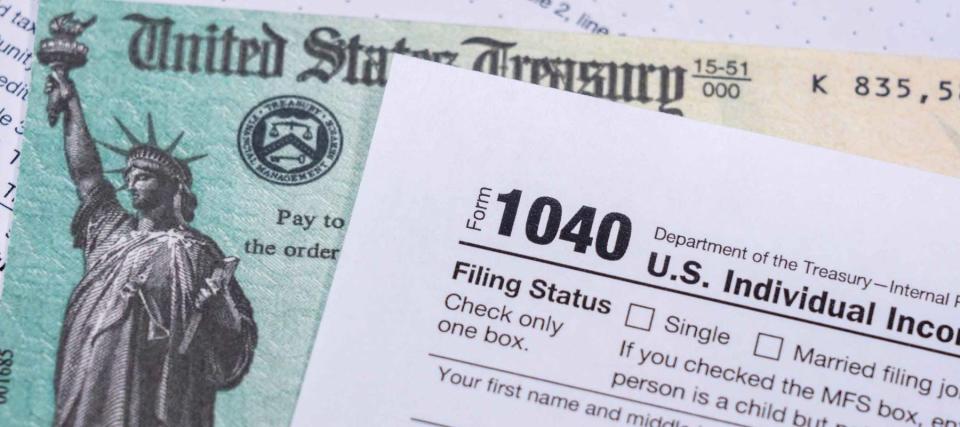Recently filed taxes? A bonus stimulus check from the IRS may be on its way

The IRS may have a little more cash for you as it continues to distribute the pandemic's third round of stimulus checks, worth up to $1,400.
The tax agency says another batch of 1.1 million direct payments are on their way to Americans this week, mostly consisting of extra money for people who already received some relief cash in the latest go-round.
You might receive a bonus stimulus check — which the IRS calls a "plus-up" payment — if you haven't gotten the full $1,400 so far, and you recently submitted your 2020 taxes.
Should you expect a stimulus check plus-up?

The latest batch of stimulus checks includes more than 570,000 plus-up payments with a value of nearly $1 billion, the IRS said in a news release on Wednesday. Over the past three weeks, more than $3.5 billion worth of the bonus amounts have been delivered.
The plus-ups provide additional support for Americans whose 2020 tax returns qualify them for a larger dose of relief.
When the checks first started going out in March, the IRS would have determined both your eligibility and the size of your payment based on the most recent data it had at its disposal. That would have been your 2019 tax return if, like most people, you're not fast on the trigger with your taxes.
If you had a good year in 2019, you may not have qualified for a full $1,400 stimulus check. Those went to individuals with returns showing adjusted gross income (total income minus some deductions) of $75,000 or less, and couples with AGI of no more than $150,000.
Let's say you've recently filed your 2020 taxes, and it shows that your income fell last year because of the pandemic. You may now be eligible for more stimulus — and will receive a plus-up.
Other reasons for getting a plus-up
The IRS says you also may be eligible for a plus-up payment if you:
Got married last year and have filed a joint return for the first time, as long as your income falls under the $150,000 limit.
Filed a 2020 tax return that includes a new child or dependent.
Are a veteran receiving disability compensation from the Department of Veterans Affairs and weren’t required to file a tax return for 2019 but have submitted one for 2020.
Were previously exempt from filing your taxes and used a nonfiler tool to claim your first stimulus check last year.
The plus-ups included in the latest batch of payments (the eighth so far) are just a small portion of the approximately 164 million checks and direct deposits that have gone out since March 12. Approximately $386 billion in aid has been distributed directly to Americans in the past eight weeks.
The IRS says it will continue sending out stimulus money in weekly batches.
If you don’t normally file a tax return and have not yet received any stimulus cash from the government, the IRS is urging you to file your 2020 taxes so you can "get all the benefits (you're) entitled to under the law."
Those include not only stimulus checks but also the upcoming monthly payments for families that are part of an expansion of the child tax credit.
What if you need cash but aren’t getting a plus-up?

If you’ve already received all the stimulus support you qualify for, but you’re still short on cash, you have some options to free up some funds right now.
Cut the cost of your debt. If you've been relying on your credit cards during the pandemic, you've got plenty of company. Slash your credit card debt — and pay it off sooner — by rolling your balances into a debt consolidation loan at a lower interest rate.
Make saving money your policy. Because so many drivers have been using their cars less frequently during COVID, some auto insurance companies have been offering discounts. If your insurer isn’t cutting you a deal, it's time to find a policy at a better price. You also could save hundreds on homeowners insurance by shopping around for a lower rate.
Swap out your mortgage for a cheaper one. If you’re a homeowner and haven't refinanced your loan in the last year, you could be missing out on some truly game-changing savings. An estimated 13 million homeowners still have the potential to save an average $283 a month with a refi, according to mortgage and data technology provider Black Knight.
Turn your pennies into profits. Don’t assume your financial well-being is entirely dependent on cutting costs. You can generate extra income in the stock market — and you don’t have to be rich. One popular app helps you invest your "spare change" to grow a diversified portfolio.

 money
money 